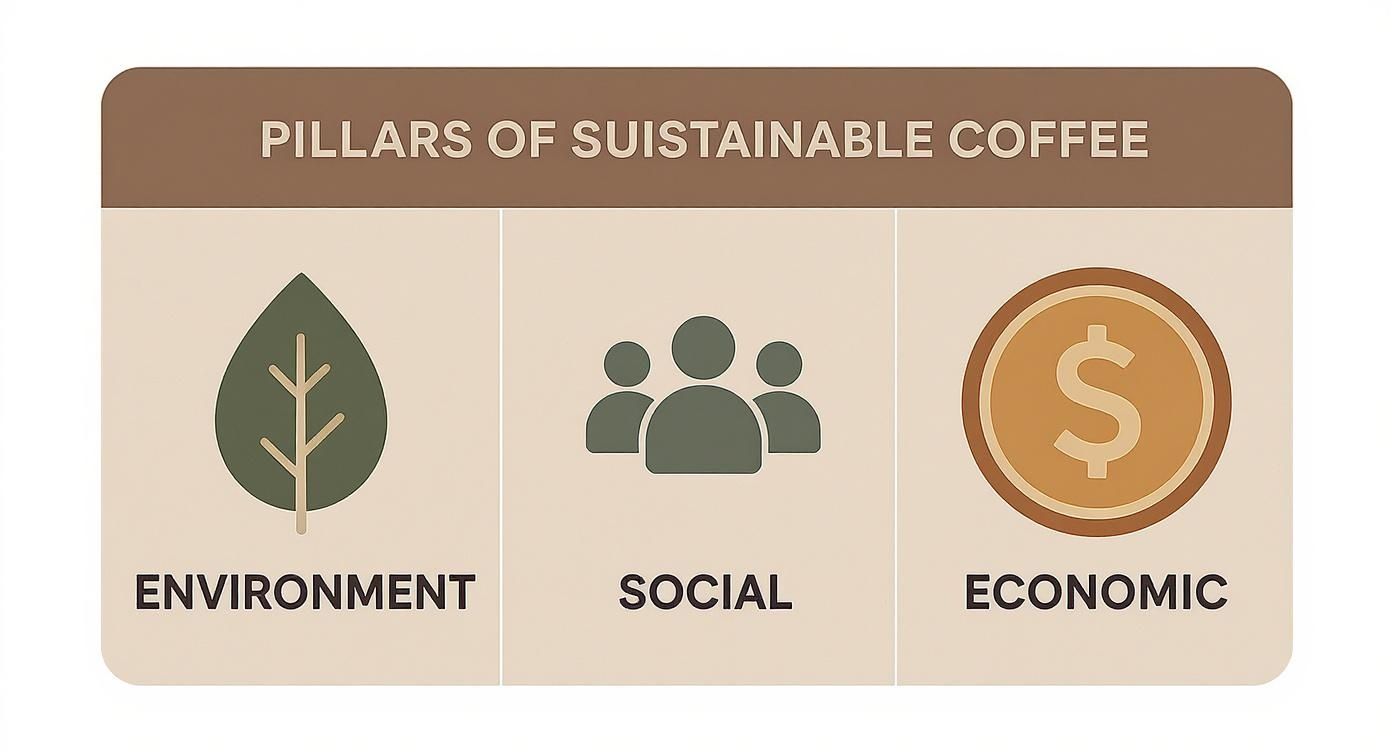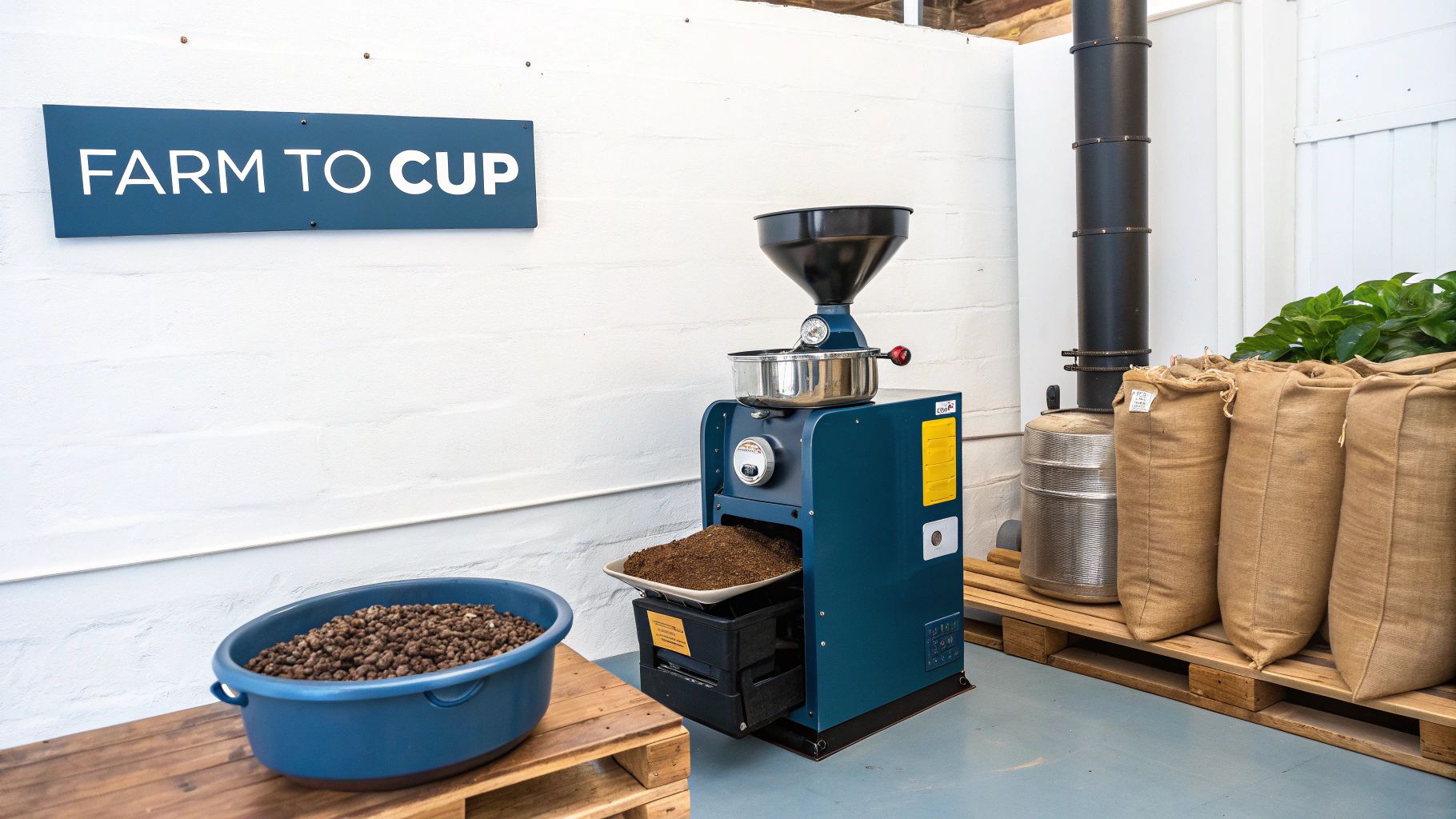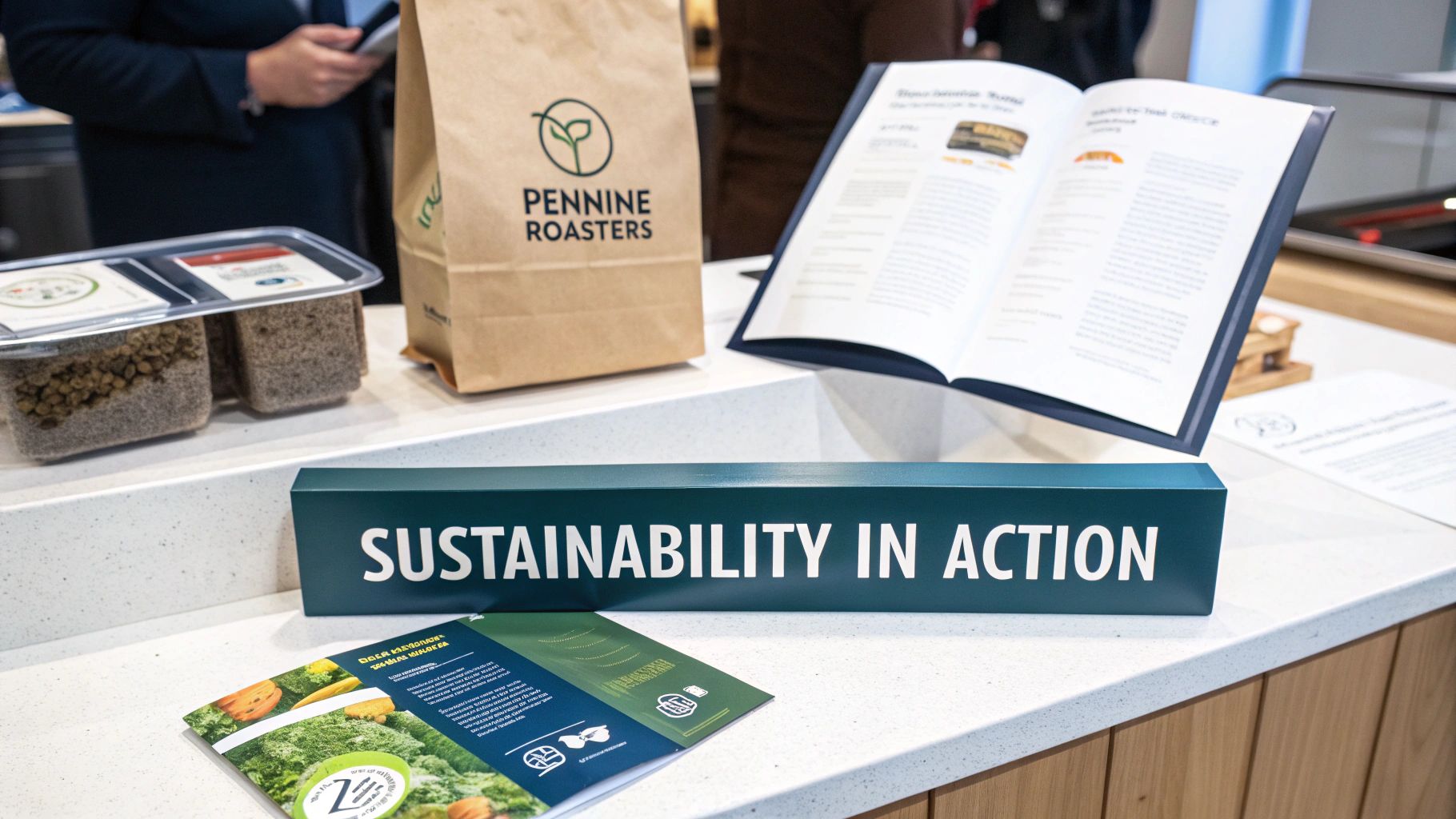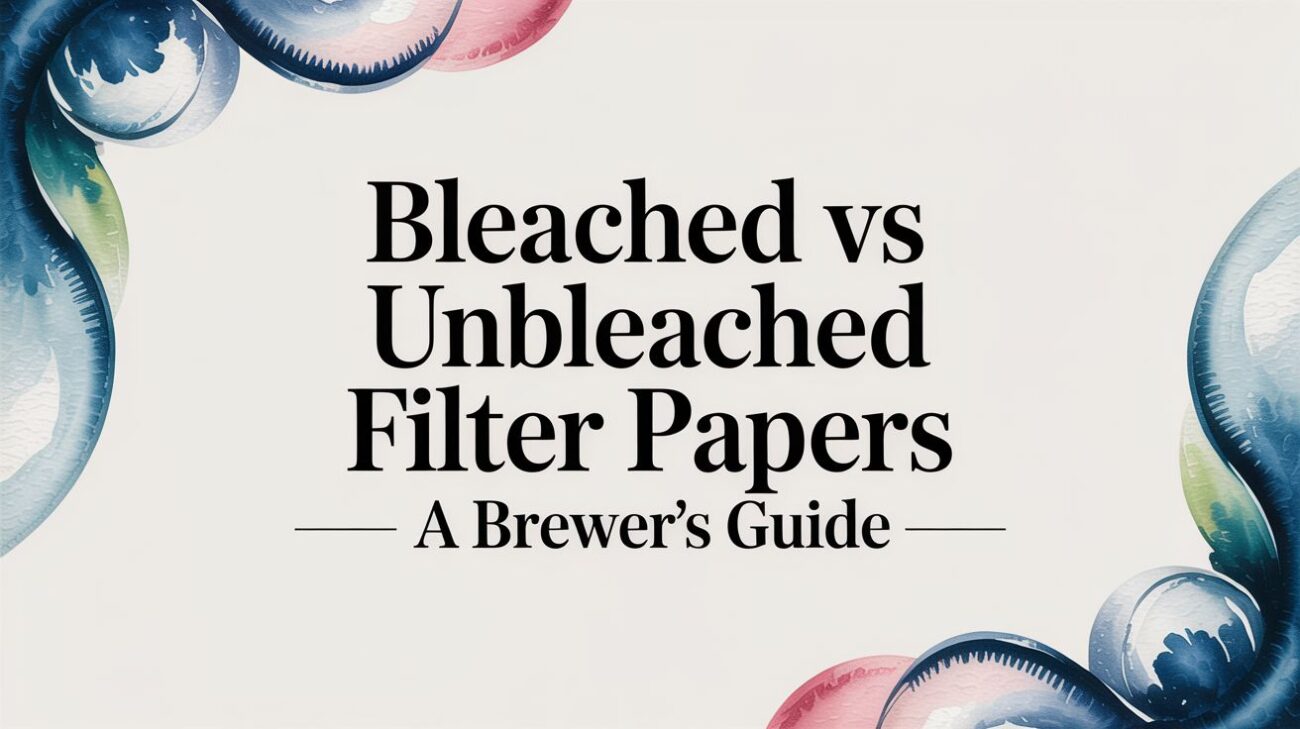A Guide to UK Sustainable Coffee Companies
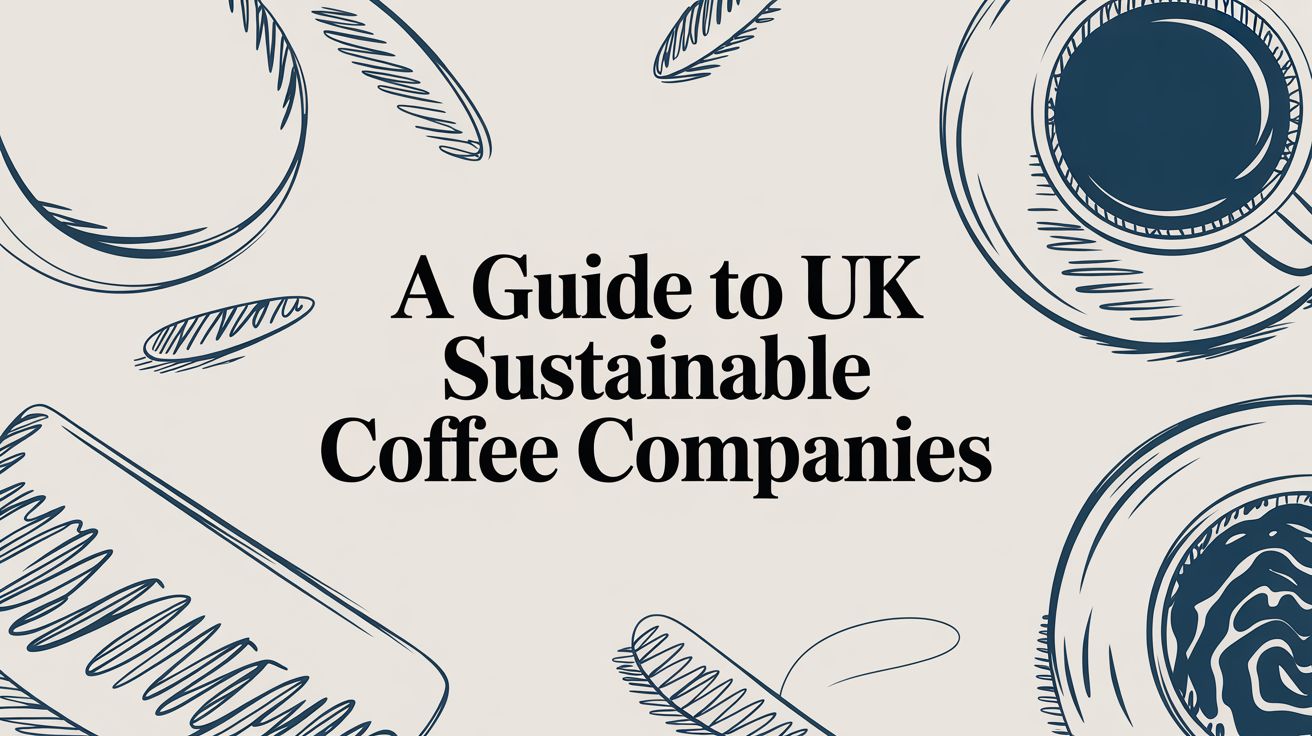
That first sip of morning coffee feels incredible, but have you ever stopped to think about how good it is for the planet and the people who grew it? When you're looking for sustainable coffee companies, it’s easy to get lost in a sea of buzzwords. True sustainability, though, is about much more than just a label—it's a balanced approach that supports the entire journey from farm to cup.
What Makes a Coffee Company Truly Sustainable?
To see past the clever marketing, I find it helpful to think of sustainability as a three-legged stool. If one leg is shorter than the others or missing entirely, the whole thing wobbles and eventually collapses. A genuinely sustainable coffee company builds its foundation on three equally crucial pillars: environmental stewardship, social fairness, and economic stability.
This balanced approach is the only way to create a system that can thrive for generations. Without all three in place, even the best intentions can fall short.
The Three Pillars of Coffee Sustainability
A truly ethical operation doesn't just pay lip service to these ideas; it weaves them into the very fabric of its business. Let's break down what each one actually means in practice:
- Environmental Care: This is all about protecting our planet. It covers farming methods that preserve biodiversity, conserve water, and slash carbon emissions. Think shade-grown coffee that protects natural habitats or organic farming that keeps harmful pesticides out of the ecosystem.
- Social Fairness: This pillar is about people. It ensures safe working conditions, fair labour practices, and meaningful community investment for the farmers and workers who cultivate the beans. It’s the human side of the supply chain.
- Economic Stability: This ensures that growing coffee is a viable way to make a living. It means farmers receive a fair price for their crops—one that covers their cost of production and allows them to invest in their farms and families for the long haul. This is a massive part of what separates speciality coffee from the rest; you can learn more in our guide on what is specialty coffee.
True sustainability isn't just about being "green." It's a holistic commitment to ensuring the entire coffee ecosystem—from the soil and the farmer to the roaster and the consumer—is healthy, equitable, and resilient for the future.
This comprehensive approach extends far beyond the farm. For a coffee company to be truly sustainable today, it also needs to get its head around the principles of embracing sustainability in ecommerce, which touches everything from packaging to logistics.
As coffee drinkers become more aware, the demand for this kind of transparency is soaring. The UK coffee scene has become a major hub for ethical products, with exports hitting an impressive 92,050 metric tonnes in 2023 as buyers increasingly hunt for traceable and ethically sourced beans. You can discover more insights about the UK's role in the global coffee market on Freshdi.com.
Decoding Certifications on Your Coffee Bag
Staring at the collection of logos and stamps on a bag of coffee can feel like trying to solve a puzzle. Each symbol represents a promise, but what do they actually mean for the farmers, the environment, and the quality of your morning brew? Getting to grips with these certifications is the first step towards confidently choosing a truly sustainable coffee.
Think of these labels as a shorthand for a company’s values. They provide independent, third-party proof that a brand is meeting specific standards, taking the guesswork out of your purchase and helping you support practices you believe in.
This visual guide breaks down the core principles of sustainable coffee, showing how environmental, social, and economic factors are all woven together.
As the infographic shows, real sustainability needs a balance of all three pillars. It’s a commitment that ensures neither people nor the planet are sacrificed for profit.
The Major Players in Coffee Certification
While dozens of certifications exist, there are a few heavyweights you’ll commonly find on coffee sold in the UK. Each has a slightly different focus, but they all share the goal of creating a fairer and more environmentally sound coffee industry.
- Fairtrade: This is one of the most recognised ethical labels on the planet. Its main focus is on social and economic fairness, guaranteeing farmers receive a minimum price for their coffee that covers the cost of sustainable production.
- Rainforest Alliance: You'll know this one by its little green frog seal. This certification zeroes in on environmental conservation, championing farming practices that protect forests, conserve water, and safeguard wildlife habitats.
- Soil Association Organic: This label is your guarantee that the coffee was grown without synthetic pesticides, herbicides, or fertilisers. It’s a powerful sign of a farm's commitment to soil health and biodiversity.
These certifications offer a reliable, audited guarantee that a coffee company is walking the walk when it comes to its ethical claims.
Comparing Key Sustainable Coffee Certifications
To help you decide which certification aligns best with your own values, it helps to see them side-by-side. Here’s a simple breakdown of what each one brings to the table.
| Certification | Primary Focus | Key Environmental Standards | Key Social Standards |
|---|---|---|---|
| Fairtrade | Economic Stability & Farmer Empowerment | Promotes environmentally sound agricultural practices. | Guarantees a minimum price and an additional Fairtrade Premium for community investment. |
| Rainforest Alliance | Biodiversity & Ecosystem Conservation | Prohibits deforestation, protects wildlife, and promotes climate-smart agriculture. | Requires safe working conditions and fair treatment of workers. |
| Soil Association Organic | Natural Farming & Soil Health | Prohibits synthetic pesticides and fertilisers, focusing on natural methods. | Emphasises high standards of animal welfare (less direct for coffee) and environmental protection. |
This comparison really highlights that while all are beneficial, they have different strengths. A coffee can even be dual-certified—for example, being both Fairtrade and Organic—offering multiple layers of assurance.
If you're particularly interested in the social impact, you can explore more about what Fairtrade coffee means for farmers and communities in our detailed guide.
Looking Beyond Certifications to Direct Trade
While certifications provide a great baseline, another model is gaining momentum among speciality coffee companies: direct trade.
This approach is all about roasters building personal, long-term relationships directly with coffee farmers or cooperatives, effectively cutting out the middlemen. The goal is to pay farmers a premium price—often significantly higher than Fairtrade minimums—based on the exceptional quality of their beans.
Direct trade isn't a formal certification with a shiny logo. Instead, it relies on something much more personal: the roaster's own transparency. Genuinely sustainable companies practising direct trade will be an open book about their sourcing. They'll share detailed stories, photos, and even pricing information from the farms they partner with.
This model fosters true collaboration and gives farmers the economic security to invest in even better, more sustainable growing practices, year after year.
Sustainable Practices From Farm To Cup
True sustainability in coffee doesn’t just stop once the beans leave the farm. For the best coffee companies, ethical sourcing is only the beginning. The journey from the roastery to your kitchen involves a series of critical choices that reveal a brand’s genuine commitment to the planet.
This is the part of the supply chain where the small operational details make a huge difference. We’re talking about everything from the energy used to roast the beans to the packaging they arrive in, and even the waste left behind after your final sip.
Energy-Efficient Roasting
The roasting process is incredibly energy-intensive, traditionally gulping down huge amounts of natural gas and producing significant carbon emissions. But forward-thinking roasters are now investing in modern, energy-efficient technology to drastically shrink their environmental footprint.
Modern roasting machines, for instance, can recapture and reuse heat, cutting gas consumption by up to 80% compared to old-school drum roasters. This doesn't just slash carbon emissions; it also leads to a cleaner, more consistent roast, proving that sustainability and quality can absolutely go hand-in-hand.
The UK’s coffee shop sector, a key battleground for sustainable innovation, now boasts over 12,200 outlets. Much of this growth is driven by brands that weave sustainability into their core mission. In fact, the UK coffee processing industry has invested so heavily in these energy-efficient technologies that it has reduced the carbon footprint of production by an average of 20% over the past five years. If you want to dive deeper into the UK coffee market's green evolution, you can explore the latest statistics on lumina-intelligence.com.
Revolutionising Coffee Packaging
Packaging is one of the most visible—and problematic—aspects of the coffee industry. Traditional coffee bags are often made from complex, multi-layered plastics and foils that are impossible to recycle. They’re destined for landfill, where they can take centuries to break down.
Recognising this problem, truly sustainable coffee companies are leading the charge towards better alternatives. The focus has shifted to materials that are either fully recyclable in standard household bins or, even better, commercially or home compostable.
A brand's choice of packaging is a direct reflection of its end-to-end commitment to sustainability. Moving beyond single-use plastics isn't just a trend; it's a fundamental responsibility for any company claiming to be eco-conscious.
This shift involves more than just swapping out materials; it requires a complete rethink of the packaging lifecycle. Some brands now offer refill schemes or use minimalist, plastic-free designs to eliminate waste entirely, showing a real circular approach to their operations. Many companies are also making it easier for customers to choose sustainable options, like offering high-quality organic coffee beans in the UK in environmentally friendly packaging.
Smart Waste Reduction In Cafes And Roasteries
Finally, the commitment to sustainability extends to managing waste at every single stage. In roasteries and cafes, this means putting smart systems in place to reduce, reuse, and recycle.
Forward-thinking businesses are turning coffee's main by-products into valuable resources. Here’s what that looks like in action:
- Composting Coffee Grounds: Used coffee grounds are nitrogen-rich and make a fantastic soil conditioner. Many cafes now partner with local gardens or offer free grounds to customers for their own compost heaps.
- Repurposing Chaff: Chaff, the papery skin that flakes off beans during roasting, is often collected and used as animal bedding or composted on a large scale.
- Water Conservation: Advanced roasting equipment can incorporate closed-loop cooling systems, which significantly cuts down on the amount of water needed in the process.
By embracing these practices, sustainable coffee companies show a holistic understanding of their impact. They prove that responsibility doesn't stop at the farm gate but continues right through to the final cup, making sure every step is as kind to the planet as possible.
How to Vet a Coffee Company's Claims
With so many brands throwing the word "sustainable" around, it's easy to get lost. But learning to look past the marketing slogans is the most powerful tool you have. Becoming a savvy coffee detective isn’t about being cynical; it’s about making sure your money supports brands that are genuinely walking the walk.
Think of it this way: a truly sustainable company wears its ethics like a badge of honour. They’ll want you to see their sourcing information, partnerships, and impact data. If you have to click through endless pages of vague promises to find a single concrete detail, that’s your first red flag.
Look for Transparency Reports
One of the clearest signs of a committed company is a transparency report. These are usually published once or twice a year, and they’re where a brand should lay all its cards on the table. A good report is brutally honest, showing you what they’re doing well and where they still need to improve.
A proper report is packed with specifics, not just feel-good stories. Here’s what to look for:
- Sourcing Details: Does the report name the exact farms, washing stations, or cooperatives they partner with? Vague references to a "region" just don't cut it.
- Pricing Information: The most honest companies share the FOB (Free on Board) price they paid for their coffee. This number shows how much money actually made it to the coffee's country of origin.
- Impact Metrics: Look for real numbers on their environmental and social projects. How much water did they conserve? What was the measurable outcome of their community investment?
Vague language is the best friend of greenwashing. Phrases like "eco-friendly," "ethically sourced," and "planet-conscious" mean very little without specific, verifiable proof to back them up. True sustainability is demonstrated with data, not just adjectives.
Dig Into Sourcing Information
Beyond a formal report, zoom in on the information provided for each individual coffee. When you’re trying to understand a company's environmental impact, it's crucial to look beyond surface-level claims and see how waste management integrates into ESG strategies for the full picture. The more detail a roaster gives you about a coffee, the more confident you can be in their sourcing.
Take a look at a product page for a specific bag of beans. Does it offer clear traceability? For example, our own pages for single origin coffee beans are designed to give you a clear line of sight right back to where your coffee was grown. That level of detail shows a real connection and a deeper relationship with the producers.
Key Questions to Ask Any Coffee Company
Armed with this knowledge, you can start asking direct questions. Whether you're sending an email or a message on social media, a brand that’s proud of its practices will be happy to answer. If they dodge your questions or can't answer, that tells you everything you need to know.
Here’s a simple checklist of questions to help you vet any coffee brand:
- Can you name the specific farm, cooperative, or washing station that grew this coffee? This is the most basic test of traceability.
- Do you publish an annual transparency or impact report? This demonstrates a serious commitment to accountability.
- What percentage of your packaging is plastic-free and fully recyclable or compostable? This gets at their commitment to tackling waste beyond just the bean.
- How do you measure your carbon footprint, and what steps are you taking to reduce it? This question probes their environmental actions beyond just sourcing.
- Can you share what price you paid for this coffee at origin (FOB price)? This is the gold standard for financial transparency and ensuring farmers are paid fairly.
By asking these pointed questions and knowing what to look for, you can cut through the noise. You’ll be able to confidently tell the difference between truly sustainable coffee companies and those just using green marketing, ensuring your money supports genuine, positive change in the industry.
Bringing It All Together: A Real-World Example
Theory is one thing, but seeing these principles in action makes them much easier to grasp. Let's walk through the story of a fictional but entirely realistic UK-based roaster, 'Pennine Roasters', to see how an outstanding sustainable coffee company operates from farm to cup.
This example will show how the different threads we've discussed—sourcing, roasting, packaging, and transparency—can be woven together to create a genuinely ethical business.
Sourcing With Integrity and Transparency
Pennine Roasters built its reputation on a direct trade relationship with the 'Valle Sagrado' cooperative in Peru. Instead of buying anonymous beans on the open market, they work directly with this specific group of farmers, visiting them annually to build trust and understand their needs.
This relationship allows them to pay a premium price, consistently 40% above the Fairtrade minimum, which rewards the cooperative for its commitment to high-quality, organic farming. But Pennine Roasters doesn't just say this; they prove it.
Their annual transparency report details exactly how much they paid for each coffee lot and highlights specific community projects their premiums have funded, such as a new clean water filtration system for the local school. This level of detail is a hallmark of truly sustainable coffee companies.
Roasting and Packaging With the Planet in Mind
Back in their Yorkshire roastery, Pennine Roasters’ commitment to sustainability continues. They invested in a Loring roaster, a state-of-the-art machine that uses up to 80% less energy and produces far fewer emissions than traditional models. This single choice directly slashes their operational carbon footprint.
They also tackled packaging head-on from day one. All of their coffee bags are made from renewable, plant-based materials and are certified for commercial composting. For their local community, they even offer a refill programme for customers to bring their own containers, eliminating packaging waste entirely.
By connecting their environmental efforts at the roastery with their ethical sourcing at origin, Pennine Roasters demonstrates a holistic approach. Sustainability isn't just one department's job; it's embedded in every decision they make.
A Model of Authentic Sustainability
Pennine Roasters embodies the principles of a truly sustainable coffee company by excelling across all three pillars:
- Environmental: They support organic farming at origin and use energy-efficient technology and compostable packaging at home.
- Social: They invest in their partner cooperative, ensuring farmers have the resources to thrive and their community benefits directly from the partnership.
- Economic: They guarantee fair and stable prices, providing the cooperative with the financial security needed to plan for the future.
This story gives you a clear benchmark for what to look for. When a company is open about its partners, transparent with its pricing, and thoughtful about its operational impact, you can be confident that you’re supporting a business that is genuinely making a positive difference. They prove that exceptional coffee and profound ethical responsibility can, and should, go hand in hand.
How Your Next Coffee Can Make a Difference
Choosing your next bag of coffee is more than just a weekly shop. It’s a chance to vote with your wallet for the kind of world you want to see. Every decision you make sends a powerful signal to the coffee industry, encouraging brands to put people and the planet first.
This guide has given you the tools to look past the marketing fluff. By focusing on the three pillars of sustainability—environmental, social, and economic—you can spot the sustainable coffee companies that are genuinely walking the walk. It's about looking for meaningful certifications, asking for clear sourcing details, and backing roasters who care about their footprint.
Empowering Your Choices
Your curiosity is your most powerful tool. Don’t be afraid to dig a little deeper and ask brands the tough questions we've laid out. When you choose a company that's open about its practices, you're helping build a more accountable and ethical coffee industry for everyone.
This shift doesn't need to be complicated. It all starts with a few simple actions:
- Researching your favourite brands using the checklist we provided.
- Prioritising coffees with a clear, traceable path right back to the farm or cooperative.
- Supporting roasters who invest in recyclable or compostable packaging.
Your daily coffee ritual holds real power. By making informed choices, you directly contribute to a fairer, healthier, and more resilient global coffee community, ensuring its future for generations to come.
Ultimately, the goal is to find a coffee that’s as good for the world as it tastes in your cup. We hope you use this guide not as a rigid rulebook, but as a framework for making more mindful decisions. Even small changes, like learning more about composting coffee grounds at home, add up to a more sustainable lifestyle and a better coffee industry.
Any Questions? Your Guide to Sustainable Coffee
Dipping your toes into the world of sustainable coffee can feel a bit overwhelming, and it’s natural to have a few questions. As you start to notice what sets certain sustainable coffee companies apart, a few common queries tend to pop up. Let's clear the air on some of the big ones so you can make choices you feel good about.
Lots of people ask what the real difference is between a vague term like 'ethically sourced' and a formal certification like Fairtrade. While 'ethically sourced' sounds great, it's not a regulated term and lacks third-party oversight. In contrast, that Fairtrade logo is a solid guarantee. It means specific economic, social, and environmental standards have been audited and met, giving you a reliable promise.
Why Does Sustainable Coffee Cost More?
It's a fair question. You've probably noticed that a bag of certified organic or direct trade coffee often has a higher price tag. This isn’t just clever marketing; that extra cost is a direct investment in the very principles that make the coffee sustainable in the first place.
The higher price of sustainable coffee isn't an arbitrary markup. It's a reflection of the true cost of producing coffee in a way that is fair to people and kind to the planet, paying for fair wages, environmental protections, and higher quality beans.
So, where does that extra money actually go? A big slice goes straight to the farmers, making sure they receive a living wage that covers their costs and supports their families and communities. It also funds farming methods that are better for the planet but more work-intensive, like shade-growing and organic cultivation. This avoids cheap, harmful chemical pesticides and fertilisers, which is better for everyone.
How Can I Be More Sustainable at Home?
Your commitment to sustainability doesn’t end at the checkout. You can carry those positive practices right into your own kitchen, shrinking your coffee ritual's environmental footprint one cup at a time.
Making a few small tweaks to your daily routine can add up to a big impact over the long run. Here are a few simple, practical tips to get you started:
- Ditch Single-Use Pods: If you love your pod machine, switch to reusable stainless steel pods. You can fill them with your favourite ground coffee, which drastically cuts down on plastic and aluminium waste.
- Choose Reusable Filters: Instead of single-use paper filters, why not try a permanent filter made from stainless steel or cloth for your pour-over or drip machine? They last for ages and many people find they even improve the flavour.
- Compost Your Grounds: Used coffee grounds are a fantastic, nitrogen-rich addition to any compost bin. If you don't have a garden, check with local community gardens or allotment projects—they'll often be delighted to take them off your hands.
- Brew What You Need: It sounds simple, but one of the best ways to cut waste is to only brew the amount of coffee you actually plan to drink. This stops you from pouring old, cold coffee down the sink and saves both water and precious beans.
By adopting these habits, you complete the circle of sustainability. Your conscious choices as a coffee drinker, combined with mindful practices at home, help nudge the entire industry toward a more responsible and resilient future.
At Seven Sisters Coffee Co, we are committed to sourcing exceptional coffees that are as kind to the planet as they are to your palate. Discover our range of ethically sourced, freshly roasted beans and make your next cup a truly sustainable one. Find your perfect brew at https://sevensisterscoffee.co.uk.

